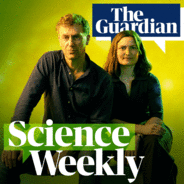Ian Sample is joined by Dr James Kinross, colorectal surgeon and author of the book Dark Matter: The New Science of the Microbiome, to answer all your questions about gut health. In episode two, Kinross explains what else, beyond antibiotics, can damage our microbiome, how we can start to repair it, and gives his top tips for keeping our gut microbes happy. Help support our independent journalism at theguardian.com/sciencepod

Wissenschaft & Technik
Science Weekly Folgen
Twice a week, the Guardian brings you the latest science and environment news
Folgen von Science Weekly
300 Folgen
-
Folge vom 29.05.2025Your microbiome questions answered: part two
-
Folge vom 27.05.2025Your microbiome questions answered: part oneIan Sample is joined by James Kinross, colorectal surgeon and author of the book Dark Matter: The New Science of the Microbiome, to answer all your questions about gut health. In episode one, James explains how the gut microbiome gets set up, how it impacts our early development, and the effect antibiotics can have on our microbes. Help support our independent journalism at theguardian.com/sciencepod
-
Folge vom 22.05.2025The extraordinary promise of gene editingDoctors in the US have become the first to treat a baby with a customised gene-editing therapy after diagnosing the child with a severe genetic disorder that kills about half of those affected in early infancy. Ian Sample explains to Madeleine Finlay how this new therapy works and how it paves the way for even more complex gene editing techniques. David Liu, a professor at the Broad Institute of MIT and Harvard and the inventor of these therapies, also describes the barriers that could prevent them reaching patients, and how he thinks they can be overcome. Help support our independent journalism at theguardian.com/sciencepod
-
Folge vom 20.05.2025The latest twist in a Canadian medical mysteryIn March 2021, the Toronto-based reporter Leyland Cecco heard about a memo sent by New Brunswick health officials that warned about a possible unknown neurological syndrome thought to be affecting about 40 people. Since then the story has taken many twists and turns, most recently with a peer-reviewed study that concludes there is no mystery illness after all. Cecco tells Madeleine Finlay about the devastating symptoms that patients experienced, and why the research is unlikely to resolve the conflict over what has been causing them. Help support our independent journalism at theguardian.com/sciencepod
